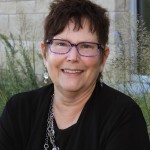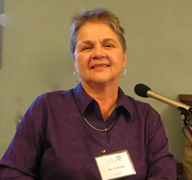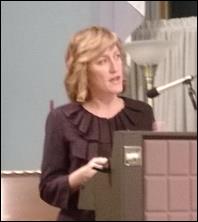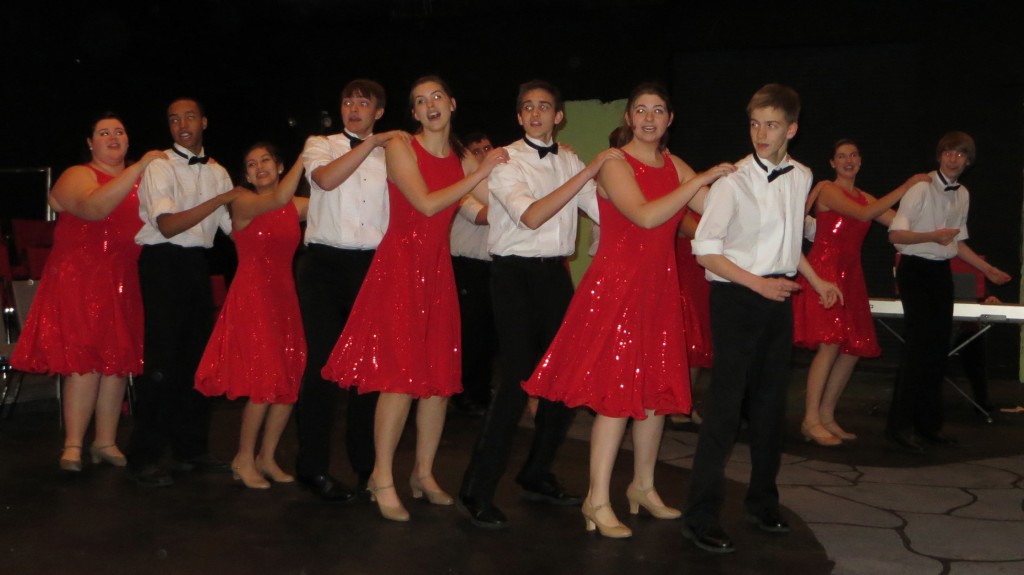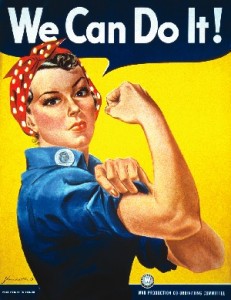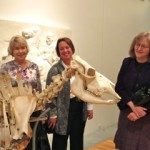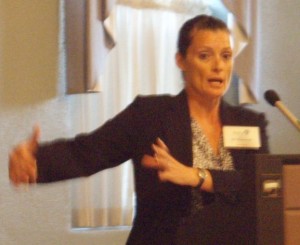Celebrating Another Great Year!
The Manhattan Branch celebrated another productive year at the May meeting! Some of the accomplishments highlighted at the Annual Wrap-up and Celebration included 20 new members, an expanded electronic presence, a redesigned newsletter, three AAUW-WAGE $tart $mart workshops and $4,150 in fundraising to support them, hosting the Kansas AAUW Annual Meeting in April, a new notecard fundraiser, and three branch scholarship awardees. As Lady Bird Johnson once said “It is wonderful to be in on the creation of something, see it used, and then walk away and smile at it.” We should all feel this way about all of our projects, President Nancy Bolsen stated.
President Bolsen thanked the outgoing officers with the traditional red rose, followed by the installation of the new officers and recognition of new members and outstanding recruiters. Jan Freeby presented this year’s Outstanding Branch Member Award to Nancy Bolsen for her outstanding leadership as president. Nancy helped revitalize the branch by providing leadership in revamping the organizational structure and newsletter; increasing membership recruitment and involvement; expanding on-campus and community outreach programs; promoting AAUW National and branch scholarships; and placing greater emphasis on mission-based programs and public policy issues.
Barbara Gatewood received the President’s Award for Outstanding Board Member for providing energetic and creative leadership that has resulted in new activities, branch growth, visibility, and fundraising opportunities. Also honored were the past presidents, interest group chairs, and members with 1-5+ decades of service. Special recognition was given to our 50 Year Honorary Life Members: Wilma Jo Adams, Marilyn Bunyan, Helen Janes, and Vadaline Strohm. The successful Silent Auction fundraiser was coordinated by Jan Freeby and Karen Tinkler. A total of $210.00 was raised.

April Branch Meeting Focuses on Next Generation of Science Standards
Dr. Jackie Spears, professor of curriculum and instruction at K-State, gave an insightful presentation on the history and importance of K-12 science education standards and the development of the Next Generation Science Standards (NGSS). Kansas was among the 26 states that took the lead in revising the 15-year old science education standards. These new science standards encompass many of the advances that have occurred in the STEM (science, technology, engineering, and mathematics) fields and new approaches to science education. To date, 11 states and the District of Columbia have adopted the NGSS to better prepare students for college, careers, and citizenship.
The “standards movement” in public education gained momentum in the early 1990s, resulting in the No Child Left Behind Act (NCLB, 2001). Under NCLB, each state was required to develop standards in mathematics and reading and methods of testing to ensure progress towards having all students meet those standards. Emerging from this context were standards that varied significantly from state to state and emphasized minimum performance levels that all students could reach. In response to NCLB, the National Governors Association and Council of Chief State School Officers provided leadership for the development of common standards that ensured that all high school graduates were prepared for careers and/or participation in postsecondary education. This state-led, voluntary effort also sought input from teachers, parents, school official, and experts.
Kansas educators have historically valued high-quality education for all of its citizens. In 2007, Kansas Department of Education adopted the Kansas Science Standards to assist state educators in selecting and developing curricula and assessing student progress. Seven interwoven standards were specified with statements on what students should know, understand, and do at each K-12 level.
The development of the new NGSS was done by a diversified committee formed by the National Research Council in a two-step process. First, they developed A Framework for K-12 Science Education that identified the core ideas and practices in the natural sciences and engineering that all students should be familiar with by the time they graduate. Based on this framework, 26 Lead State Partners (including Kansas) subsequently developed the NGSS. Thus, the new standards were developed by the states themselves, rather than the federal government.
The NGSS are distinctive from other science standards in several aspects. The “performance expectation” requires students to apply the knowledge rather than just “know” or “understand” it. Each performance expectation integrates three dimensions: a core disciplinary idea, a science or engineering practice, and a crosscutting concept. Dr. Spears provided a challenging exercise that compared wording in previous standards with the new NGSS that focuses on interrelating and applying knowledge. NGSS provides a dramatic conceptual shift in education. It requires new curricula to interconnect the nature of science and performance, providing a deeper understanding of knowledge.
Dr. Spears has been a leading author and educator in physics at K-State and is currently Director of the Center for Science Education in the College of Education. Her current research interests include increasing the participation of individuals from underrepresented populations in STEM fields and developing strategies to integrate STEM research into high school science classrooms. She also serves on the Kansas Board of Regents STEM teacher development initiative and is past president of Faculty Senate. Dr. Spears can be reached at jdspears@k-state.edu or 785-532-5530.

March 2014 Branch Program Celebrates Women’s History Month
The Manhattan Branch celebrated Women’s History Month with an insightful talk by Dr. Sue Zschoche on women’s important roles in history and society. As a K-State distinguished history professor and former department head, Dr. Zschoche has taught courses on the history of American women, domestic violence, American medicine, and history of higher education. She has received several prestigious awards, including K-State’s Presidential Award for Teaching Excellence.
Dr. Zschoche traced how women’s rights in America have changed dramatically since the early settlers. Throughout much of America in the 1800’s, women had limited rights and were unequal to men. Marriage exacerbated the situation, because American law, which was based on English common law, further withdrew women’s rights and dictated a subordinate position to men. Married women were not allowed to make contracts, have wills, take part in legal transactions, or even have legal custody of their children upon a husband’s death.
Women’s History Month, which is celebrated in March in the United States, United Kingdom, and Australia had its origins to the first International Women’s Day observed in 1909. Prior to becoming a month-long celebration, President Jimmy Carter issued a presidential proclamation declaring the week of March 8, 1980 as National Women’s History Week. The proclamation stated “From the first settlers who came to our shores, from the first American Indian families who befriended them, men and women have worked together to build this nation. Too often the women were unsung and sometimes their contributions went unnoticed. But the achievements, leadership, courage, and strength, and love of the women who built America was as vital as that of the men whose names we know so well.”
In response to the growing popularity of Women’s History Week, Congress designated the month of March 1987 as Women’s History Month. Since 1995 U.S. presidents have issued annual proclamations designating March as Women’s History Month. Today, communities, organizations such as AAUW, schools, universities, and government agencies plan events and stimulating programs about women’s roles in history and society.
Dr. Zschoche elaborated that our history is not complete without the understanding of the vital role women have played in all facets of our society. Furthermore, it is often women who hold the key to understanding what has happened in history, if we are only willing to listen. The accomplishments, contributions, and character of women throughout history are now being better understood, but we still have many challenges.
The meeting ended with many lively questions about women’s history and how the Manhattan Branch may have additional activities to promote Women’s History Month. Branch members interested in learning more about Dr. Zschoche’s courses or who have additional questions may contact her at 785-532-0365 or suez@k-state.edu.
February 2014 Branch Program Looks at Successful College Financial Planning
The February 10th Manhattan Branch program was presented by Jodi Kaus, the Program Director of K-State’s Powercat Financial Counseling (PFC).
It is a student-driven program that provides K-State students with free assistance and counseling on personal finances, helping students become successful money managers. PFC provides free information and education to currently enrolled K-State students seeking help with issues such as: budgeting, credit use, saving, identity theft, managing debt, student loan management, and transitioning to work after college.
PFC began in August 2009. It is funded by student government and housed in the K-State Student Union. In addition to the director, the staff includes two graduate assistants and 16 peer financial counselors. The peer counselors include students studying personal financial planning, business finance, accounting, and agricultural economics.
Counselors help students review and evaluate the financial options of the cost of education such as, scholarships, grants, part-time work, work-study, gifts and loans.
The peer counselors help students create a financial plan, preferably during a student’s first semester and continuing each semester with follow up sessions to monitor financial progress. This helps graduating students understand their financial situation and their education loans enabling them to transition into their careers successfully.
K-State’s Powercat Financial Counseling has received recognition both locally and nationally. Secretary of Education, Arnie Duncan, has praised PFC as a financial literacy program to emulate. Contact information: jkaus@k-state.edu powercatfinancial@k-state.edu, 785-532-2889.
January 2014 Branch Program Speaker Sonya Britt
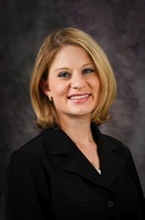
Dr. Sonya Britt, Family Studies and Human Services, Kansas State University
Dr. Sonya Britt, Assistant Professor of Family Studies and Human Services and Director of Personal Financial Planning at K-State, gave an engaging presentation on The Correlation with Money Arguments and Relationship Satisfaction at the January 11th branch meeting held at the K-State Union. Sonya holds a master’s degree in Marriage and Family Therapy and doctorate in in Personal Financial Planning with an emphasis in financial therapy. She teaches courses in the undergraduate and graduate Personal Financial Planning Programs, works with the university’s Institute of Personal Financial Planning, and was the founding president of the Financial Therapy Association.
As a leader in financial therapy, Sonya is conducting groundbreaking research to help individuals, couples and families struggling with financial and emotional problems. Her presentation highlighted recent research findings on how people deal with money and its effects on relationships. Data show that money ranks third on the list of topics most frequently argued about in relationships, and even happy couples disagree about finances. Arguing about money often relates to how people view money, e.g. spenders versus savers, lower household net worth, and if the wife makes more than the husband. Overall, money arguments are usually more intense, harder to resolve, and are more frequent when couples are financially stressed or their household income is low. Couples that argue in the early years of marriage often have a lower marital satisfaction later, resulting a greater risk of divorce.
So what can be done about reducing financial problems and arguments? She advised pre-marital financial counseling, setting spending limits, having monthly financial meetings, and lowering stress. Several suggestions were given on how to improve communications with one’s partner on financial issues and individual strategies for reducing stress, such as yoga and breathing deeply, reducing caffeine, getting organized, and allowing time for pets and hobbies.
Sonya (sbritt@k-state.edu, 785-532-3541) also provided some resources for those seeking financial counseling, such as Housing and Consumer Credit Counseling, Inc. (www.hcci-ks.org/) – Manhattan Director, Shania Dekat, 324-0217); a website for finding a Certified Financial Planner® (www.cfp.net/), and Credit Karma (www.creditkarma.com/) for tracking your credit score.
K-State students can take advantage of free, financial counseling service provided by Powercat Financial Counseling (PFC). Sonya is a faculty liaison to PFC, and the director, Jodi Kaus, will be presenting at the next branch Meeting on February 10.
 December 2013 Branch Program Really POPPED!
December 2013 Branch Program Really POPPED!
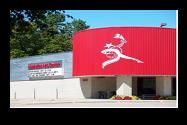 The talented Manhattan High School Pops Choir, under the direction of Chad Pape, performed at the December 9th branch meeting held at the Manhattan Arts Center. The students, dressed in festive holiday attire, sang and danced to classical rock tunes with energetic moves and captivated the audience with their outstanding a capella singing.
The talented Manhattan High School Pops Choir, under the direction of Chad Pape, performed at the December 9th branch meeting held at the Manhattan Arts Center. The students, dressed in festive holiday attire, sang and danced to classical rock tunes with energetic moves and captivated the audience with their outstanding a capella singing.
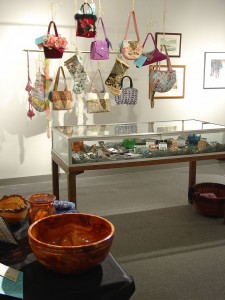
Manhattan Arts Center
The Pops Choir is one of the six talented but demanding choir groups at MHS that provide students with an exceptional music experience. It is an auditioned ensemble that performs in the community throughout the course of the school year. Participation requires a high level of student commitment. We were fortunate to have these outstanding students provide the branch’s holiday program. The performance was followed with a dessert reception with the performers and an opportunity to visit the Wrap It Up! holiday art exhibition and sale of items made by regional artists. ![]()
November 2013 Branch Program Speaker Dr. Kerri Day Keller
Dr. Kerri Day Keller, Director of Career and Employment Services at K-State, spoke on the topic Rosie’s Legacy: Women in Today’s Workforce at the November 11th branch meeting on Veteran’s Day at the First Congregational Church in Manhattan. Her talk began with an historical overview of the cultural icon “Rosie the Riveter” that was used in WWII to encourage women to join the workforce to support the war effort. It is commonly used today as a symbol of feminism and women’s economic power. Dr. Keller discussed the progress and challenges of women in today’s workforce and ways to create opportunities for success so We Can Do IT!
The first image of “Rosie the Riveter” by Normal Rockwell appeared on the cover of Saturday Evening Post on Memorial Day, 1943. Because of copyright protection, the “We Can Do It!” version, created for a Westinghouse Company’s war poster by Pittsburgh artist, J. Howard Miller, became more widely distributed. Interestingly, Miller’s poster disappeared for nearly four decades, until it was re-discovered in the early 1980’s and became associated with feminism and women’s rights movement. Dr. Keller provided data on “Today’s Rosies.” About 72 million or 59% of the 123 million women in the U.S. are in the workforce. While 27% of employed women have part-time jobs, women are projected to account for 51% of the growth in the labor market from 2008-2018. However, women continue to earn 82 cents for every man’s dollar, and only 2% of CEO’s are women. Thus, the employment statistics for women are “Not too Rosie”. Factors contributing to this inequitable situation are 1) background influences, such as racial and socio-economic status; 2) personal variables, such role conflict and self-efficacy; and 3) environmental factors, including the influence of parents, teachers, and peers. Insights on what we can do to reduce barriers and improve opportunities for women in the workforce were presented. Emphasis was placed on creating opportunities for success, serving or referring women to appropriate role models, and facilitating support networks, such as AAUW. We are pleased to announce that Dr. Keller is a new member of the Manhattan Branch and K-State’s official university representative as an AAUW partner member institution. Because K-State is a university partner, all full-time K-State undergraduate students can receive FREE AAUW e-student affiliation by completing the application online at www.aauw.org. She also had a key role in organizing the $tart $mart Salary Negotiation Workshops and Facilitator Training on K-State’s campus, October 6-8. Future workshops will be coordinated through her office (CES, 785-532-6506).
October 2013 Branch Program Museum Tour
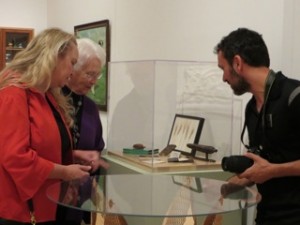
Pictured L – R Melissa Kirkwood, Rosalie Thompson inspect grain specimens with tour guide Richard Dean Prudenti.
Members and guests gathered for a brunch and brief business meeting at the First Congregational Church on October 5, then visited the Marianna Kistler Beach Museum of Art for a tour of the Museum of Wonder guided by Richard Dean Prudenti, Special Projects Coordinator. This unique exhibition (February 12 – October 13, 2013) honored Kansas State University’s 150th Anniversary with eclectic displays of artifacts, curiosities, and hidden treasures highlighting the university’s diverse fields of study and research since it was founded in 1863.
The Museum of Wonder was inspired by cabinets (or rooms) of curiosities created in the 16th and 17th centuries by wealthy Europeans and merchants to display items collected around the world. These collections were the precursors to museums and ignited people’s interest in nature, art, science, and other cultures.
Without traditional exhibit labels, viewers were challenged to make associations between diverse groups of objects, such as wheat-related products and machines, entomological specimens and drawings, scientific and musical instruments, books, maps, decorative art, household items, clothing and textiles, and animal fossils and skeletons. A smaller adjacent installation, the Library of Wonder presented reading materials, computer resources, and hands-on activities related to the Museum of Wonder.
The exhibition was done in collaboration with the K-State Libraries with display objects provided by many units across campus. More information and a video of the exhibition are available at: http://beach.k-state.edu/explore/exhibitions/museumofwonder.html.
Appreciation is extended to AAUW branch member Linda Duke, Museum Director; Kathrine Schlageck, Senior Educator; and Richard Dean Prudenti for an excellent tour.
September 2013 Branch Program Speaker DC Hackerott
Our first program of the year was presented by DC Hackerott. She has been a financial advisor with Edward Jones for nearly fourteen years. DC shared a number of statics; some were surprising and others were a wake-up call.
Did you know that 61% of wealth in the U.S. is in the hands of women? Over the next several years, women will inherit 70% of estate assets; more women than men are earning college degrees; 46% of women are the family breadwinners and according to actuarial figures, baby boomer women are likely to become widowed by the age of 67. More than ever, women need to educate themselves in the area of finances. DC noted that women tend to be more conservative investors due to “bag lady syndrome.” This is the concern that at any time their situation may change rendering them the stereotypical “bag lady.” Inflation is your enemy as you age, so you need to keep that in mind as you invest. Investing is based on your goals and risk tolerance, so it’s very personal. If you have questions or would like to get advice from DC, feel free to contact her at 785-776-5902.

